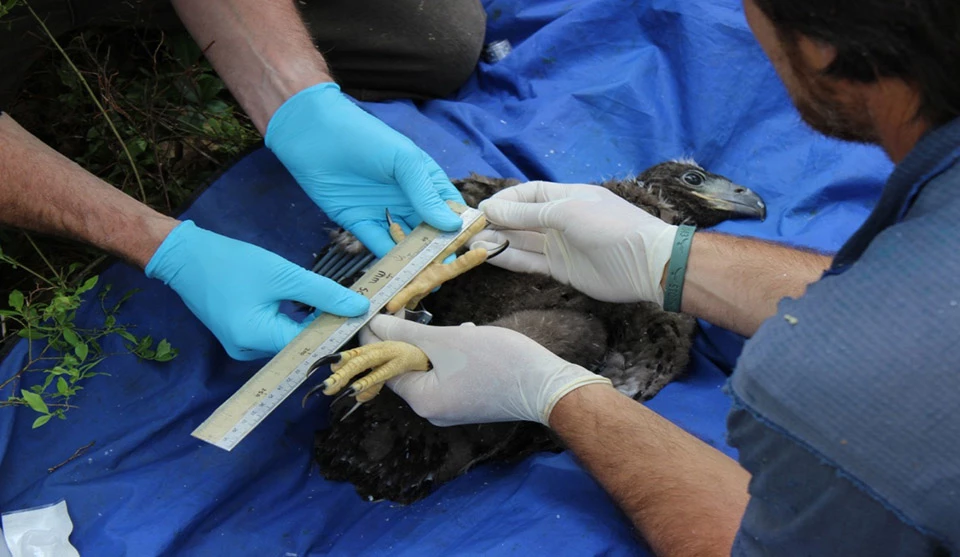
NPS Photo.

What We Do
- Provide oversight for the humane care and use of wild, vertebrate animals in research, teaching, and training in parks.
- Assist parks and researchers in achieving compliance with the Animal Welfare Act (AWA) and Inter-agency Research Animal Committee (IRAC) principles.
- Provide guidance to promote animal welfare, human and animal safety, and scientific integrity in activities occurring in NPS units.
How We Do This:
- Review projects involving vertebrate animals to be used in research, teaching, and training within NPS units. This includes projects already approved by another IACUC.
- Consult with park representatives and researchers about proposed animal activities and advise on regulatory requirements and current standards of care for wildlife research animals, emphasizing the 3 R's: refinement, reduction, and replacement.
- Visit locations where vertebrate animal activities are conducted for post-approval monitoring (PAM).
- Report to appropriate authorities on the use of animals in research within NPS units.
- Advise, consult, and collaborate with other agencies on animal welfare oversight in wildlife research.
Submission Forms
All submissions to the NPS IACUC are accepted via email. Submit the appropriate NPS Form and attachments to the email address listed on the Form. Larger documents may take several minutes to open. Thank you for your patience.- If you have IACUC approval from another agency or university, please complete the Concurrence Form (PDF 2,242 KB) and submit along with your approved protocol.
- If you do not have IACUC approval, please complete one of the following forms:
- General Submission Form (PDF 8,751 KB)
- Field Study Form (PDF 5,609 KB) - To check if your project qualifies as a Field Study, please see this USDA Tech Note.
- Continuing review for active projects with NPS IACUC
- Amendment Form (PDF 1,2019 KB)
- Annual Review Study Form (PDF 1,290 KB)
For questions about projects involving wild, vertebrate animals and the need for NPS IACUC review or for any questions about animal welfare oversight by the NPS IACUC, please contact us.
NOTE: NPS units issue permits for conducting scientific projects within their respective boundaries through the Research Permit and Reporting System (RPRS). NPS IACUC approval DOES NOT replace Park specific permit requirements. Please contact your NPS park representative for specific requirements and procedures.
Personnel Training, Qualifications, and Experience
The NPS IACUC requests that all vertebrate animal research submissions provide adequate information regarding the training and qualifications for personnel conducting activities in the field within NPS units. These should be addressed within the submission materials and include, but are not limited to:
- Role of each person listed in conducting any procedures with wild vertebrate animals.
- Investigator may not be involved in conducting field research so list who will be the responsible, qualified person conducting and/or overseeing the procedures.
- Experience with the species or justification for translating other species’ experience.
- If not all personnel are experienced, list who will train and how training will be conducted.
- Supervision will be provided for students or less experienced personnel by qualified expert and criteria for if/when allowed to conduct procedures independently.
- Experience with the specific procedures and appropriate certification such as:
- Chemical immobilization qualifications and training courses completed
- Aerial Capture, Eradication, and Tagging of Animals (ACETA), if applicable
- Euthanasia methods, particularly in the field, and if personnel in this role have been adequately trained. This should include firearm selection and qualifications if humane killing by gunshot is the most appropriate method.
IACUC Resources
Guidelines
- American Veterinary Medical Association's Guidelines for the Euthansia of Animals (2020) (2020) (PDF 12,112 KB)
- NPS IACUC Bat SOP for the Study of Bats in the Field (2023) (PDF 180 KB)
- American Society of Mammologists Guidelines for the Use of Wild Mammals in Research and Education (2016)
- American Fisheries Society Guidelines for the Use of Fishes in Research (2014)
- Ornithological Council Guidelines to the Use of Wild Birds in Research (2023)
- American Society of Ichthyologists and Herpetologists Guidelines for Use of Live Amphibians and Reptiles in the Field and Laboratory Research (2004)
- NPS IACUC Small Mammal SOP for Small Mammal Field Studies (2025)
Safety
- DOI Safe Work Practices for Working with Wildlife (2020)
- CDC Reducing the Risk of SARS-CoV-2 Spreading Between People and Wildlife
Regulations
- Animal Welfare Act, regulations, and standards from the USDA Animal and Plant Health Inspection Service (APHIS)
- U.S. Government Principles for the Utilization and Care of Vertebrate Animal Used in Testing, Research, and Training
- Animal Welfare Information Center
Last updated: January 13, 2026
